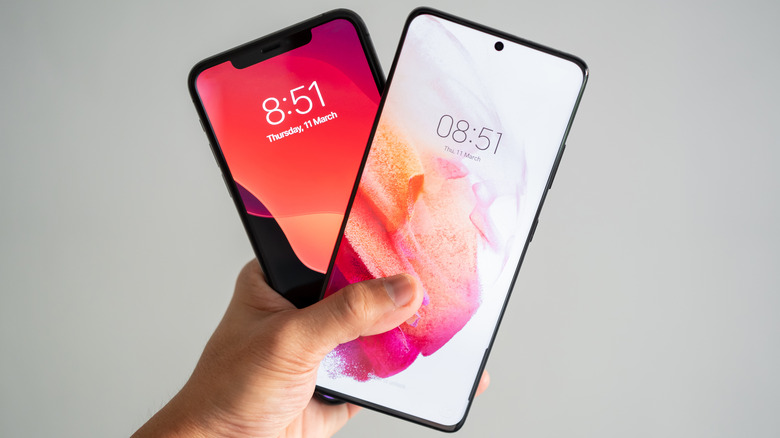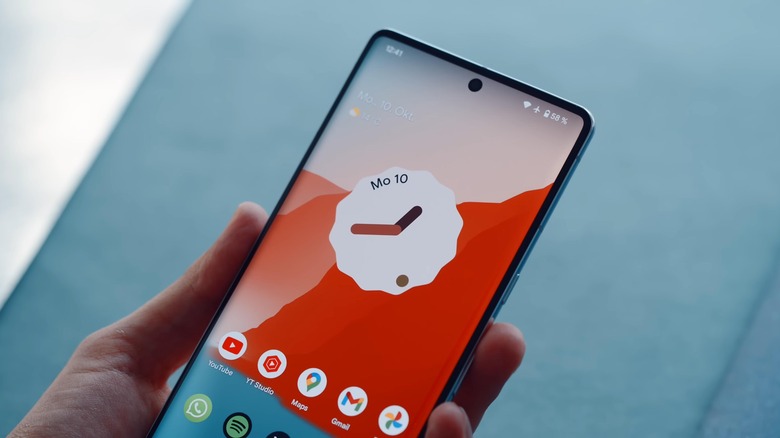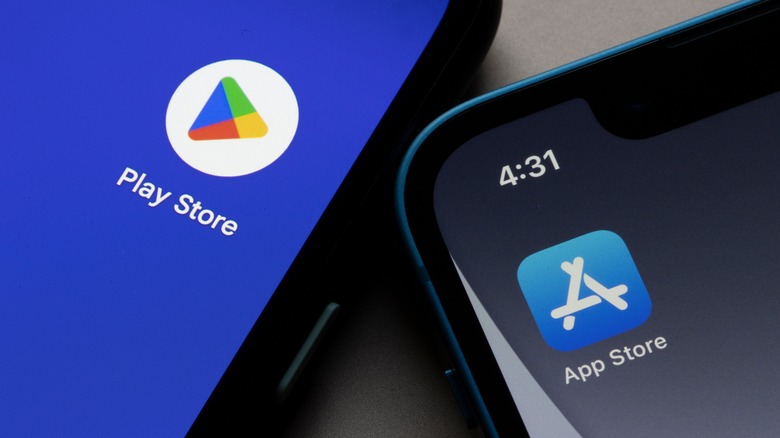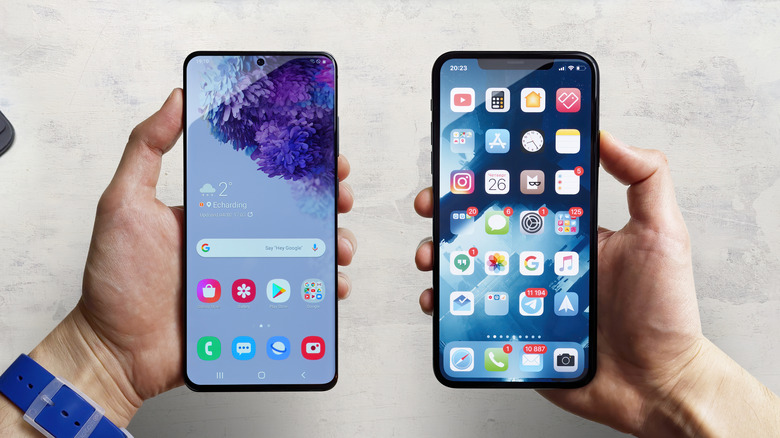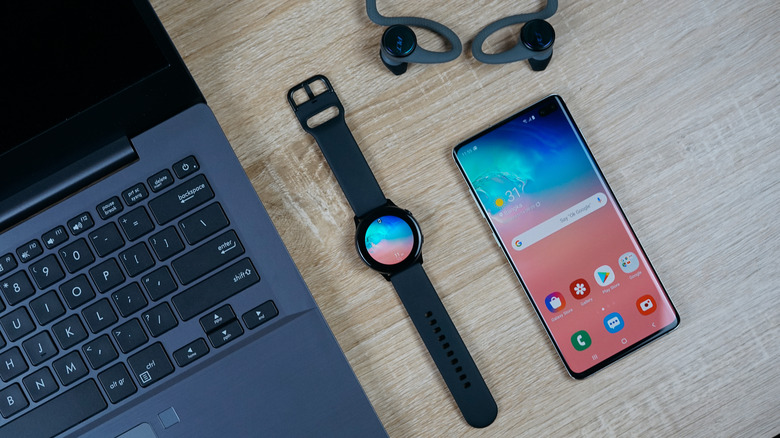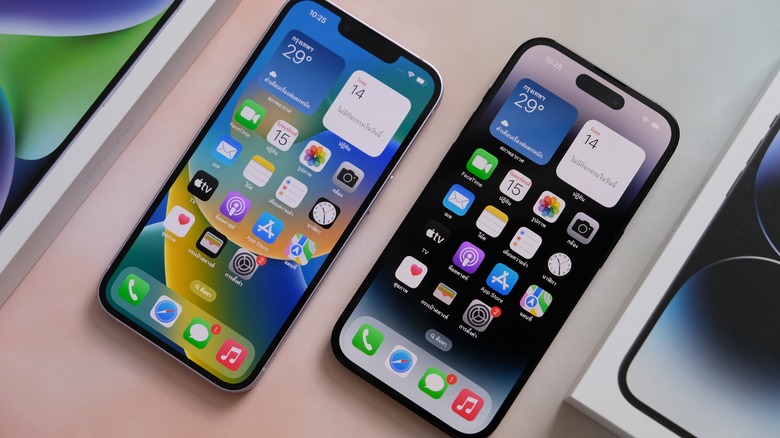5 Big Reasons You Shouldn't Switch From Android To iPhone
So you've been using an Android phone for some time, and you're thinking, what would it be like to get an iPhone? Well, at least once, that question has popped up in every Android user's head. Over the years, Apple has created an aspirational value for its brand, which drives new or long-term Android users to its products, particularly iPhones. However, Android and iOS are very different platforms and suit users differently.
It's not necessary that every Android user would love the classic iOS experience. In fact, certain things are done so differently that getting an iPhone could turn into a terrible and expensive decision. Fortunately, we've compiled a list of five big reasons why you shouldn't consider switching to an iPhone. It will give you a clear idea of how far apart these operating systems are from each other, and only if you're okay with all of these should you put your money into an iPhone.
You don't get as many customization features
The first reason you shouldn't switch from an Android phone to an iPhone is the lack of customization. With iOS 16, Apple provided certain personalization features, but they aren't as good as those on Android.
For instance, if you try to change your wallpaper on an iPhone, all you get in the iOS library is a handful of options in categories like Features, Astronomy, Emojis, and so on. On the other hand, Android provides more wallpapers, and it's not like you've to download them from a third-party app, as they're available in the phone's Wallpaper settings menu.
What's more is that whenever you set a new wallpaper on Android, the Material You framework picks the dominant colors and adjusts the entire UI around it. On top of that, Android phones give you the freedom to download your favorite launcher, font pack, app themes, widget size, and so on.
You can even set your favorite song as your ringtone and alarm clock sound, and you might not want to give that up. Moreover, Android devices are leaps and bounds ahead of iPhones in terms of personalization options.
iPhone doesn't allow sideloading
Another big reason you shouldn't switch from Android to iOS is apps. Apple's App Store has over 1.5 million apps, some of which are free, while the others demand a subscription fee. Although the set contains some of the best mobile applications, it just doesn't compete with Android's library of apps on the Google Play Store, which provides more than three million apps.
More importantly, Apple doesn't allow you to sideload apps on iPhones, meaning you can't just search for an app's APK file on the internet and install it on an iPhone. In other words, you can only download apps from the App Store, which will remain that way, at least for the near future. Although you shouldn't install just about any random app you find online, Android devices offer the option to do so if you're sure where you're getting the app from.
Android phones provide more features to choose from
Android phones come in all shapes and sizes. You can select one with a high refresh rate display, powerful chipset, long-lasting battery, and so on. You even get an option between traditional phones or cutting-edge foldable devices. Whether you want a super affordable entry-level phone or a top-tier flagship with high-end specifications, you'll never run out of options to choose from. However, if you turn to an iPhone, all you have, for the sake of choice, are a few models.
None of the latest iPhones come with a headphone jack, nor do they have a fingerprint scanner (except for the iPhone SE 2022). You must also make peace with a notch (both on the regular and the Pro variants), charging via a Lightning port that doesn't support devices outside of Apple's ecosystem, and the absence of expandable storage. If you want an iPhone with an always-on display, there are only two models: iPhone 14 Pro and iPhone 14 Pro Max. On the other hand, the feature is readily available on most Android phones coming out in 2023.
Moreover, you have much more options when getting an Android phone, than when getting an iPhone.
You already have Android or Windows devices
If you use a Windows laptop or a Chromebook as your daily driver, you're better off without an iPhone, and here's why. Apple's iPhones are built to function seamlessly with other Apple products, like MacBooks, iPads, and AirPods. However, when it comes to connectivity with other platforms, iPhones aren't the best.
For example, if you wish to transfer files from your iPhone to your MacBook, you can do that using Apple's AirDrop within seconds. However, if you want to transfer files from your iPhone to your Windows device, or vice versa, it's way more challenging. Certain apps, like Microsoft Phone Link for iOS, allow you to share files through a peer-to-peer network, but the process isn't as efficient and could trouble you in the long run. You might copy files through a wired connection, but Lightning Port's low data transfer speeds will take more time as well.
You might think that cloud storage could get you past this, but again, you'd have to upload a file first, then download it on the other device, which requires more bandwidth and time.
Apple products are way more expensive than you'd think
The latest iPhone 14 starts at $799. Even if you're lucky enough to save some bucks through an offer or deal, you should consider the hidden costs that might go into getting its accessories. And we're not even talking about the top-of-the-line iPhone 14 Pro Max. It's just the vanilla iPhone 14, with a 6.1-inch, 60Hz OLED screen, and 2021's A15 Bionic chip.
Whereas, if you wish to get a standard Android phone, there are several options to consider below $500. Yes, there are more expensive models, like the $799 Samsung Galaxy S23, but the point is that you can choose to opt for the more affordable model with similar features.
If you want a higher storage variant or a maxed-out iPhone 14 Pro, it's going to cost you a lot more. For instance, the 128GB iPhone 14 Pro costs $999, whereas the 128GB iPhone 14 Pro Max will set you back by $1,099.
There are Android smartphones that cost as much, and even more, like the Galaxy S23 Ultra or the Google Pixel Fold. However, if you don't want to spend thousands of dollars on a phone, you still have plenty of options when getting an Android phone, including the likes of the OnePlus 11 and Google Pixel 7 Pro.
